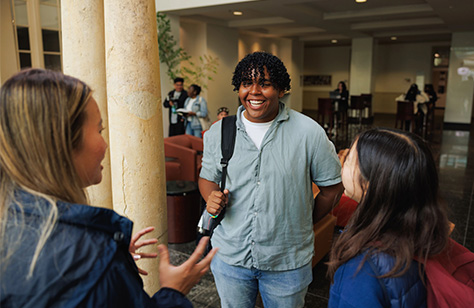New Students Guide

What Is My Cost of Attendance?
There is a limit to the amount of total awards (financial aid, loans, outside scholarships, other resources, etc.) a student can receive for the academic school year. Your financial aid budget is based on an estimated cost of attendance that includes both direct and indirect costs.
Which Application Should I File?
To be considered for federal, state, and institutional aid, you must complete a FAFSA or a CA Dream Act application every academic year. Undergraduate university grants and scholarships require a FAFSA or CA Dream Act upon initial entry into the university.
| Application | Who Should File |
|---|---|
| Free Application for Federal Student Aid (FAFSA) | Domestic students who are U.S. citizens or eligible noncitizens and meets general eligibility requirements. |
| California Dream Act | Undocumented and DACA students who are California residents and do not meet FAFSA filing requirements. FAFSA vs CA Dream Act |
| Application | Who Should File |
|---|---|
| Free Application for Federal Student Aid (FAFSA) | Domestic students who are U.S. citizens or eligible noncitizens and meets general eligibility requirements. |
Deadlines & Processing Timelines
The priority filing deadline is to ensure timely processing of financial aid and for our office to get you your aid package in a timely manner for the next academic year.
| Early Decision/ Early Action | January 15 |
| Regular Decision | March 1 |
| Transfer Students | March 1 |
| All Continuing Students | March 2 |
| Graduate/ Professional Students | February 23 |
For California residents applying for the Cal Grant award, FAFSA or CA Dream Act application must be submitted by March 2nd for Cal Grant award consideration.

Accept Your Financial Aid Offer
Before your financial aid is reflected on your student account, you’ll need to officially accept or decline your federal loans and complete any outstanding requirements.
Additional Aid Options
Undergraduate Students
Graduate Students
Complete Any Unsatisfied Requirements
After your financial aid application is received, you may need to complete outstanding financial aid requirements. In some instances, "expected aid" doesn't become "actual aid" until specific documents are completed and submitted to USF or to other grant or lending agencies.
To view and accept your financial aid reward
- Click on the Financial Aid tab.
- Select the appropriate award year on the top right corner.
- Click on Home tab and navigate to the Student Requirements section.
- Unsatisfied Requirements shows and outstanding tasks that needs to be completed prior to financial aid disbursement. You may click the link on each task to take you to the appropriate site to complete the requirement. Satisfied Requirements shows tasks that you have already completed.
*You may need to answer the authorization questions prior to accepting your financial aid.
If you have chosen to accept your federal loans, you also need to:
- Read and sign the Master Promissory Note (MPN). This is a legal document that you sign promising to pay back your federal loans.
- Complete Entrance Counseling. This is an interactive tutorial that shows you how to understand your loans, manage your spending, and make a plan to repay them.
Learn more about the Master Promissory Note and Entrance Counseling.
Tax Verification
Every year, the Department of Education randomly selects a group of students to verify the information provided on the FAFSA.
If you are selected by the U.S. Department of Education for verification, the procedures and documents involved must be completed before any federal funds become actual aid. You will be required to provide tax information for the student (if applicable) and the parent(s).
Citizenship Verification
If FAFSA is not able to verify your citizenship status you must provide proof of your eligible noncitizen status (for example, an alien registration card or other documents designated by the Office of Financial Aid) before they can receive federal funds. You may also provide proof of citizenship by submitting a legible copy of your passport, certificate of naturalization, or US birth certificate.
Learn more about the verification process. Your financial aid will not be applied to your student account until you’ve completed this process.
USF's Office of Financial Aid coordinates all of your outside aid awards as part of your overall financial aid package. Before those awards can be released to us, scholarship sponsors will typically require you to verify your registration or GPA. It's your responsibility to get that proof from USF's registrar in a timely way. If you receive an outside scholarship check directly, you'll need to forward it to our Student Accounts Office: Attn: Financial Aid, University of San Francisco, 2130 Fulton Street LMM- 203, San Francisco, CA 94117. If we don't receive the expected outside funds, your aid award will be adjusted.
Disbursement and Refund Processing

When financial aid is paid to a University on your behalf, this is called a "Disbursement."

A refund will be issued to you when all charges have been paid and there is a credit balance on your student account.